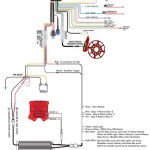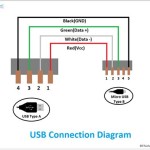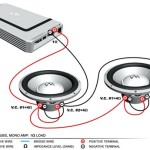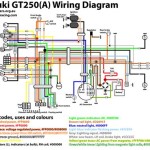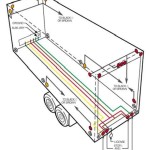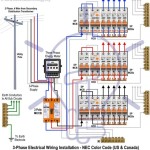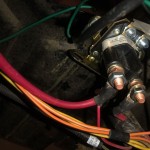Trailer Wiring Connectors are electrical connectors that are used to establish a secure and reliable electrical connection between the towing vehicle and the trailer. They provide a means of transmitting electrical signals, such as power, lighting, and braking information, between the two vehicles, ensuring the proper functioning of the trailer’s lights, turn signals, and other electrical systems. A common example is the 7-pin round connector, which is widely used for connecting trailers to passenger vehicles and light-duty trucks.
Trailer Wiring Connectors play a crucial role in enhancing safety and convenience during towing operations. They ensure that the trailer’s electrical systems are properly integrated with the towing vehicle, enabling the driver to control the trailer’s lights and brakes effectively. Additionally, they facilitate the transfer of power from the towing vehicle to the trailer, allowing the trailer to operate its electrical appliances and accessories.
A significant historical development in the field of Trailer Wiring Connectors was the introduction of standardized connectors. Prior to standardization, various manufacturers used their own proprietary connectors, leading to compatibility issues and safety concerns. The establishment of industry-wide standards, such as the SAE J1128 standard for 7-pin round connectors, ensured interoperability between different makes and models of towing vehicles and trailers.
This article will delve into the different types of Trailer Wiring Connectors available, their applications, installation procedures, and troubleshooting techniques. We will also discuss the latest advancements in trailer wiring technology and provide tips for maintaining optimal electrical connections between towing vehicles and trailers.
Trailer Wiring Connectors are crucial components for establishing a reliable electrical connection between towing vehicles and trailers. These connectors play a vital role in ensuring the proper functioning of the trailer’s lights, turn signals, and other electrical systems. Understanding the key aspects of Trailer Wiring Connectors is essential for safe and efficient towing operations.
- Standardization: Ensures compatibility between different makes and models of towing vehicles and trailers.
- Types: Various connector types are available, such as 4-pin, 5-pin, 6-pin, and 7-pin, each with specific applications.
- Wiring: Proper wiring is crucial for establishing a secure electrical connection and avoiding malfunctions.
- Installation: Correct installation techniques are essential for optimal performance and longevity.
- Safety: Ensures that electrical signals are transmitted safely and reliably between the towing vehicle and the trailer.
- Convenience: Facilitates easy connection and disconnection of trailers, enhancing the overall towing experience.
- Durability: Constructed to withstand harsh weather conditions and the rigors of towing operations.
- Maintenance: Regular inspections and maintenance are necessary to ensure proper functioning and prevent electrical issues.
- Troubleshooting: Understanding common problems and troubleshooting techniques can help resolve electrical issues efficiently.
These key aspects collectively contribute to the safe and reliable operation of Trailer Wiring Connectors. By selecting the appropriate connector type, installing it correctly, and performing regular maintenance, towing operations can be conducted with confidence and peace of mind.
Standardization
The standardization of Trailer Wiring Connectors has played a pivotal role in ensuring the compatibility and interoperability of towing vehicles and trailers from different manufacturers. Prior to standardization, each manufacturer employed their own proprietary connectors, leading to a lack of uniformity and potential safety hazards. The establishment of industry-wide standards, such as the SAE J1128 standard for 7-pin round connectors, has eliminated this issue.
Standardization is a critical component of Trailer Wiring Connectors as it ensures that the electrical connections between towing vehicles and trailers are safe, reliable, and consistent. By adhering to standardized connector types and pin configurations, manufacturers can guarantee that their products will be compatible with a wide range of vehicles. This not only simplifies the towing process but also enhances safety by preventing incorrect connections that could lead to electrical malfunctions or accidents.
Real-life examples of standardization within Trailer Wiring Connectors abound. The 7-pin round connector, standardized by the SAE J1128 specification, is the most common type of connector used for light-duty towing applications in North America. This standardized connector ensures that trailers can be easily connected to a variety of towing vehicles, regardless of the manufacturer. Other standardized connector types include the 4-pin flat connector, commonly used for smaller trailers and utility trailers, and the 5-pin flat connector, often found on boat trailers.
Understanding the connection between standardization and Trailer Wiring Connectors is essential for safe and efficient towing operations. By selecting standardized connectors and following proper installation procedures, towing vehicle operators can ensure that their trailers are properly connected and that all electrical systems are functioning correctly. This understanding also enables manufacturers to design and produce towing vehicles and trailers that are compatible with each other, enhancing the overall towing experience.
Types
Trailer Wiring Connectors come in various types, each designed for specific applications and electrical requirements. Understanding the different types of connectors is crucial for selecting the appropriate connector for a particular towing setup and ensuring proper functionality of the trailer’s electrical systems.
-
Pin Configuration
The number of pins in a connector determines the number and type of electrical signals it can transmit. Common pin configurations include 4-pin, 5-pin, 6-pin, and 7-pin connectors, each with its own unique arrangement of pins for power, ground, lighting, and braking functions. -
Connector Shape
Trailer Wiring Connectors come in various shapes, including round, flat, and oval. The shape of the connector often corresponds to its pin configuration and specific application. For example, 7-pin round connectors are commonly used for light-duty towing applications, while 4-pin flat connectors are often found on utility trailers. -
Current Capacity
Different types of Trailer Wiring Connectors are designed to handle varying levels of current. The current capacity of a connector is determined by the size and type of its pins and terminals. It is important to match the current capacity of the connector to the electrical requirements of the trailer and towing vehicle. -
Durability and Environmental Protection
Trailer Wiring Connectors are exposed to harsh environmental conditions, including moisture, dirt, and extreme temperatures. Different types of connectors offer varying levels of durability and environmental protection. Some connectors are designed with weather-resistant seals and corrosion-resistant materials to withstand these conditions.
Understanding the different types of Trailer Wiring Connectors and their specific applications is essential for safe and efficient towing operations. By selecting the appropriate connector type and ensuring proper installation, towing vehicle operators can guarantee that their trailers are properly connected and that all electrical systems are functioning correctly.
Wiring
Within the context of Trailer Wiring Connectors, proper wiring plays a pivotal role in ensuring the safe and reliable operation of the trailer’s electrical systems. Establishing a secure electrical connection is essential for transmitting electrical signals between the towing vehicle and the trailer, enabling the proper functioning of lights, turn signals, brakes, and other electrical components.
-
Wire Gauge
The thickness of the wires used in the trailer wiring harness is crucial for handling the electrical load of the trailer. Using wires with an appropriate gauge ensures that they can safely carry the current required by the trailer’s electrical systems, preventing overheating and potential electrical fires. -
Connections
Properly crimping and soldering wire connections are essential for establishing a secure electrical connection. Loose or poorly made connections can lead to intermittent electrical problems, such as flickering lights or malfunctioning brakes, compromising the safety and reliability of the trailer’s electrical systems. -
Grounding
Establishing a proper ground connection is crucial for ensuring the safe and proper functioning of the trailer’s electrical systems. A good ground connection provides a path for electrical current to return to the source, preventing voltage spikes and electrical malfunctions. -
Protection
Protecting the trailer wiring harness from the elements and potential damage is essential for long-term reliability. Using protective conduit or loom, as well as weather-resistant connectors, helps prevent corrosion, short circuits, and other electrical issues caused by exposure to moisture, dirt, and road debris.
Understanding the importance of proper wiring in Trailer Wiring Connectors is essential for ensuring safe and efficient towing operations. By selecting the appropriate wire gauge, making secure connections, establishing a proper ground, and providing adequate protection, towing vehicle operators can ensure that their trailers are properly connected and that all electrical systems are functioning correctly.
Installation
Within the context of Trailer Wiring Connectors, correct installation techniques are paramount for ensuring the optimal performance and longevity of the electrical connection between the towing vehicle and the trailer. Proper installation practices not only guarantee the safe and reliable operation of the trailer’s electrical systems but also contribute to the overall durability of the wiring harness and connectors.
Firstly, correct installation techniques ensure that the electrical connections are secure and free from loose or intermittent contacts. This is achieved through proper crimping or soldering of wire connections and the use of weather-resistant connectors and seals. Secure connections prevent voltage drops, power fluctuations, and potential electrical arcing, which can lead to malfunctioning lights, brakes, or other electrical components on the trailer.
Secondly, correct installation involves protecting the wiring harness and connectors from environmental elements and potential damage. This includes securing the wiring harness away from sharp edges, heat sources, and areas prone to abrasion. Additionally, using protective conduit or loom, as well as weather-resistant connectors, helps prevent corrosion, short circuits, and other electrical issues caused by exposure to moisture, dirt, and road debris. Proper installation techniques contribute to the long-term reliability and durability of the Trailer Wiring Connectors, ensuring many years of trouble-free operation.
Understanding the importance of correct installation techniques in Trailer Wiring Connectors is essential for safe and efficient towing operations. By following recommended installation procedures and using high-quality components, towing vehicle operators can ensure that their trailers are properly connected and that all electrical systems are functioning correctly. This understanding also enables manufacturers to design and produce Trailer Wiring Connectors that are durable, reliable, and easy to install, enhancing the overall towing experience.
Safety
Within the context of Trailer Wiring Connectors, safety is paramount as these connectors play a critical role in ensuring the reliable transmission of electrical signals between the towing vehicle and the trailer. Safe and reliable electrical connections are essential for the proper functioning of the trailer’s lighting, braking, and other electrical systems, ultimately contributing to the safety of both the towing vehicle and the trailer on the road.
-
Proper Grounding
Establishing a proper ground connection is crucial for electrical safety. It provides a path for electrical current to return to the source, preventing voltage spikes and potential electrical fires or malfunctions within the trailer’s electrical system.
-
Secure Connections
Ensuring secure connections between the towing vehicle and the trailer is essential. Loose or faulty connections can lead to intermittent electrical problems, such as flickering lights or malfunctioning brakes, compromising the safety and reliability of the trailer’s electrical systems.
-
Weather Resistance
Trailer Wiring Connectors are exposed to harsh environmental conditions, including moisture, dirt, and extreme temperatures. Using weather-resistant connectors and seals helps prevent corrosion, short circuits, and other electrical issues, ensuring reliable electrical connections even in adverse conditions.
-
Durability
Durable Trailer Wiring Connectors can withstand the rigors of towing operations and harsh road conditions. They are designed to resist vibration, shock, and abrasion, ensuring long-lasting performance and reliable electrical connections throughout the lifespan of the trailer.
Understanding the safety aspects of Trailer Wiring Connectors is crucial for ensuring safe and efficient towing operations. By selecting high-quality connectors, installing them correctly, and performing regular maintenance, towing vehicle operators can guarantee that their trailers are properly connected and that all electrical systems are functioning correctly. This understanding also enables manufacturers to design and produce Trailer Wiring Connectors that are safe, reliable, and durable, enhancing the overall towing experience.
Convenience
Within the realm of Trailer Wiring Connectors, convenience plays a pivotal role in enhancing the overall towing experience. Easy connection and disconnection of trailers translate into time saved, reduced effort, and increased efficiency during towing operations. This aspect of convenience encompasses several key facets that contribute to the user-friendliness and practicality of Trailer Wiring Connectors.
-
Plug-and-Play Design
Many Trailer Wiring Connectors feature a plug-and-play design, allowing for quick and effortless connection between the towing vehicle and the trailer. This eliminates the need for complicated wiring or splicing, making it easy for users to connect and disconnect trailers without hassle.
-
Color-Coded Connections
To further enhance convenience, Trailer Wiring Connectors often utilize color-coded wires and terminals. This intuitive design simplifies the identification of matching wires, ensuring proper connections and reducing the likelihood of errors during installation or troubleshooting.
-
Quick-Release Mechanisms
Some Trailer Wiring Connectors incorporate quick-release mechanisms, such as levers or latches. These mechanisms enable users to easily disconnect the trailer’s electrical system with minimal effort, saving time and simplifying the towing process.
-
Integrated Circuitry
Advanced Trailer Wiring Connectors may incorporate integrated circuitry, providing additional functionality and convenience. These connectors can perform functions such as voltage regulation, surge protection, and fault detection, enhancing the reliability and safety of the trailer’s electrical system.
The convenience offered by Trailer Wiring Connectors extends beyond the initial setup and connection process. The ease of disconnection allows for quick trailer detachment, whether for maintenance, storage, or switching between different trailers. This flexibility enhances the overall towing experience, making it more efficient, less time-consuming, and more enjoyable.
Durability
Within the realm of Trailer Wiring Connectors, durability stands as a cornerstone, ensuring reliable performance amidst the challenges of towing operations and adverse environmental conditions. These connectors are meticulously engineered to endure the rigors of the road, safeguarding the electrical connection between the towing vehicle and the trailer.
-
Corrosion Resistance
Trailer Wiring Connectors are exposed to moisture, road salts, and other corrosive elements. Durable connectors employ corrosion-resistant materials, such as stainless steel or plated terminals, to maintain optimal conductivity and prevent premature failure. -
Vibration Resistance
The constant vibrations experienced while towing can strain electrical connections. Durable connectors feature robust construction, shock-absorbing components, and secure locking mechanisms to withstand these vibrations without compromising electrical integrity. -
Temperature Extremes
Trailer Wiring Connectors must function flawlessly in extreme heat and cold. Durable connectors utilize high-temperature insulation, weather-resistant seals, and materials that can withstand wide temperature fluctuations without degrading. -
Abrasion Resistance
Connectors are susceptible to abrasion from road debris and other external factors. Durable connectors incorporate abrasion-resistant coatings, protective sleeves, or ruggedized housings to safeguard the electrical contacts from damage.
The durability of Trailer Wiring Connectors translates into reliable electrical connections, reduced maintenance costs, and peace of mind for towing vehicle operators. By withstanding harsh weather conditions and the rigors of towing operations, these connectors ensure the safe and efficient functioning of trailer lighting, braking systems, and other critical electrical components.
Maintenance
Within the context of Trailer Wiring Connectors, regular maintenance plays a critical role in ensuring the reliable operation and longevity of these vital components. By performing regular inspections and maintenance procedures, towing vehicle operators can proactively identify potential issues, prevent electrical malfunctions, and extend the lifespan of their Trailer Wiring Connectors.
Maintenance: Regular inspections and maintenance are necessary to ensure proper functioning and prevent electrical issues.” is a crucial aspect of Trailer Wiring Connectors because electrical connections are susceptible to wear and tear over time. Exposure to harsh weather conditions, road debris, and constant vibrations can lead to corrosion, loose connections, and other electrical problems. Regular inspections allow towing vehicle operators to detect these issues early on, enabling timely repairs or replacements to prevent more severe electrical malfunctions.
Real-life examples of “Maintenance: Regular inspections and maintenance are necessary to ensure proper functioning and prevent electrical issues.” within Trailer Wiring Connectors include:
- Inspecting the wiring harness for any signs of damage, corrosion, or loose connections.
- Cleaning the electrical contacts on the connector plugs to remove dirt, debris, or oxidation.
- Testing the electrical continuity of the wiring using a multimeter to identify any breaks or faults.
- Applying dielectric grease to the electrical contacts to prevent corrosion and improve conductivity.
Understanding the importance of regular maintenance for Trailer Wiring Connectors enables towing vehicle operators to proactively care for their equipment, ensuring safe and reliable towing operations. By adhering to recommended maintenance schedules and performing regular inspections, towing vehicle operators can minimize the risk of electrical issues, extend the lifespan of their Trailer Wiring Connectors, and enjoy peace of mind on the road.
Troubleshooting
Within the realm of Trailer Wiring Connectors, troubleshooting plays a pivotal role in maintaining the reliable operation and safety of electrical connections between towing vehicles and trailers. By understanding common problems and employing effective troubleshooting techniques, towing vehicle operators can proactively identify and resolve electrical issues, ensuring the proper functioning of trailer lighting, braking systems, and other critical electrical components.
Troubleshooting is a crucial component of Trailer Wiring Connectors because electrical connections are susceptible to various problems that can arise over time. These problems can manifest in different ways, such as flickering lights, intermittent brake signals, or complete electrical failure. Understanding common problems, such as loose connections, corrosion, or damaged wiring, enables towing vehicle operators to quickly identify the root cause of electrical issues and take appropriate troubleshooting steps.
Real-life examples of Troubleshooting within Trailer Wiring Connectors include:
- Identifying a loose connection by visually inspecting the connector plugs and ensuring a secure fit.
- Cleaning corroded electrical contacts using a wire brush or electrical contact cleaner to restore conductivity.
- Testing the continuity of the wiring harness with a multimeter to locate breaks or faults in the electrical circuit.
- Replacing damaged wiring or connectors to ensure proper electrical flow and prevent further issues.
By understanding troubleshooting techniques and applying them to Trailer Wiring Connectors, towing vehicle operators can effectively resolve electrical problems, minimize downtime, and enhance the safety and reliability of their towing operations. Troubleshooting empowers towing vehicle operators to take a proactive approach to electrical maintenance, ensuring that their trailers are always ready for the road.










Related Posts

